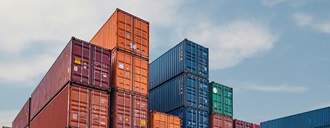ESG Benchmarking: Helping Asia Pacific companies excel their sustainability performance
Hear from a panel of ESG thought leaders, sharing their insights on how Sustainalytics ESG Benchmarking Solutions supported them understanding its ESG position among industry peers, identifying gaps and communicating sustainability accomplishments to key stakeholders.
High-Impact ESG Issues: What Your Company Needs to Know
All companies are affected by material ESG issues. Poor management of these issues can negatively impact a company’s operations, employee retention, community relations, and ultimately its share price. Learn which ESG issues cut across industries and how companies can address the most impactful MEIs affecting them.
Financing the Future: An Interview on High ESG Risk Industries and Opportunities for Banks
Companies in industrial conglomerates, steel, diversified metals, precious metals, and oil and gas producers can make take meaningful steps to reduce their material environmental, social, and governance (ESG) risk – and the negative impacts that go along with those risks. But they need guidance and access to finance. Read on to learn how banks are working with clients in these high-risk industries to set and meet targets for material improvements on ESG risk factors.
The Sustainalytics Podcast | Setting Up Your Corporate ESG Program for Success and Avoiding Early Obstacles
We discuss setting up your corporate ESG program for success and avoiding early ESG obstacles in this interview with Sustainalytics Corporate Solutions Director, Shilpi Singh. You’ll discover the importance of four ESG focus areas: leadership buy-in, planning and resourcing, ESG strategy, and reporting and communication.
Infographic | Start Your ESG Program: 4 Strategic Steps on the Journey to ESG Performance
In this infographic, we outline essential action-oriented steps to get you started on your ESG journey, including obtaining high-level executive buy-in, resourcing your efforts, strategic planning, and reporting the results of your program.
ESG Beginner's Checklist: Action Items on Overcoming Common Obstacles
Discover some of the obstacles ESG leaders face in the early stages of their journey toward sustainability — and what you can about them—in this checklist. Is your company dealing with limited human resources, overwhelming ESG information, inconsistent communication with stakeholders, understanding the competitive landscape, or funding your ESG program?
Financing the Future: An Interview on How Banks are Embarking on Their ESG Journeys
Financing the Future: Conversations in Sustainable Finance is a Q&A series where we sit down with featured ESG experts from Sustainalytics, sharing their insights on how businesses are using finance to meet the challenges of our transition to a sustainable future.
Maximum Impact: How Bond Impact Reporting Can Improve Corporate Decision Making
When companies measure and report the environmental and social impacts of their operations, they can demonstrate to investors large and small that their green and social bonds are reliable investments for maximum impact. Then investors can optimize their portfolios for impact as they do for risk and reward and companies can optimize their efforts to improve.
What You Don’t Know Can Hurt You: Getting to the Bottom of Supply Chain Risk
To address supply chain risk, business leaders must consider an increasingly broad range of factors in procurement, including environmental, social and governance (ESG) impacts. Investors, customers, and regulators are applying substantial pressure on companies to reduce risks like labor disruptions, workforce health and safety incidents, human rights issues, and shortages of natural resources.

.tmb-small.png?Culture=en&sfvrsn=5376f589_3)
-(1200-x-600-px)-(5).tmb-thumbnl_rc.png?Culture=en&sfvrsn=e57ab91e_4)

















